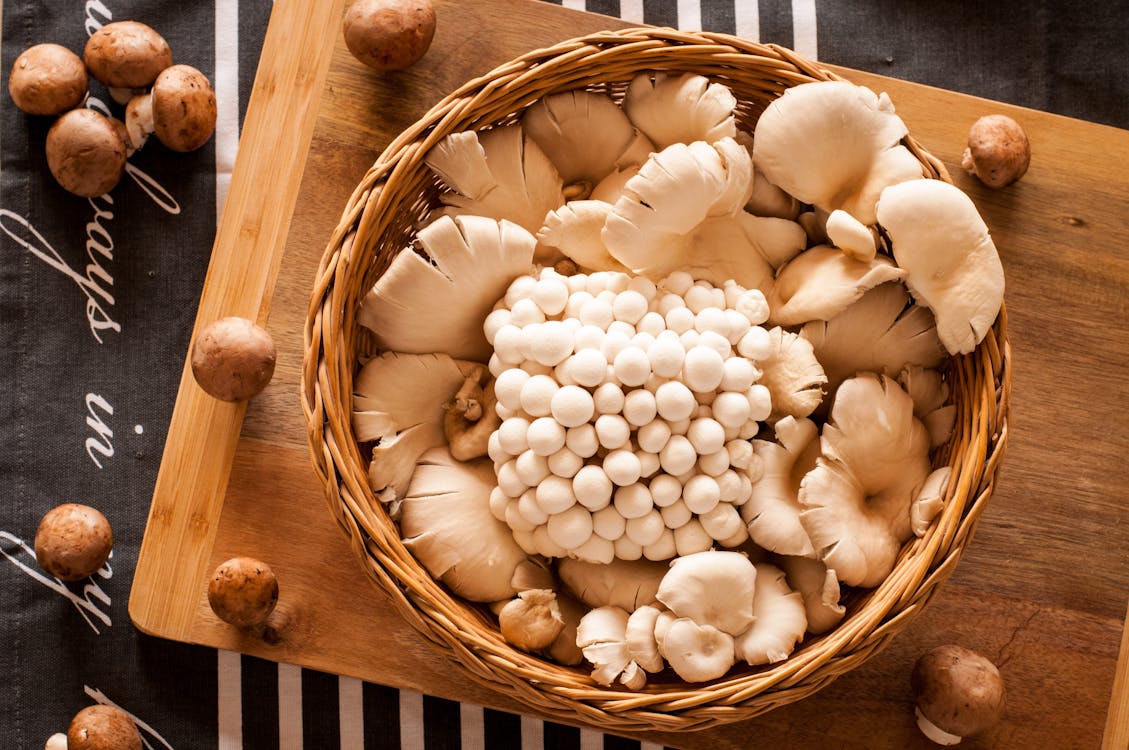
Discover the Mushrooms Used in Mushroom Coffee

Exploring the Different Types of Mushrooms Used in Mushroom Coffee
Mushroom coffee, an innovative blend of ground coffee and medicinal mushroom extracts, has emerged as a unique beverage in the health and wellness sphere. This fusion of ancient fungal wisdom and modern coffee culture traces its roots to traditional Eastern medicine, where mushrooms have been revered for centuries for their potential health benefits.
The concept of incorporating mushrooms into coffee gained traction as consumers sought alternatives to conventional caffeinated drinks. Proponents claim that mushroom coffee offers the familiar energy boost of regular coffee while providing additional health benefits attributed to various fungal species.
As interest in functional foods and natural health solutions continues to grow, mushroom coffee has carved out a niche in the beverage market.
Health-conscious individuals, biohackers, and those seeking to reduce their caffeine intake have all contributed to its rising popularity. This article aims to explore the world of mushroom coffee, delving into its composition, potential benefits, and the specific mushroom varieties commonly used. We’ll examine the nutritional profiles of these fungi, their purported health effects, and how they interact with coffee to create a unique flavor profile. Additionally, we’ll provide guidance on selecting the right mushroom coffee blend based on individual health goals and preferences.
By the end of this exploration, readers will have a comprehensive understanding of mushroom coffee, its place in the modern nutritional landscape, and the science behind its growing appeal.
What is Mushroom Coffee?

Mushroom coffee is a beverage that combines traditional coffee with extracts from medicinal mushrooms. This unique concoction aims to harness the potential health benefits of both ingredients, creating a drink that offers more than just a caffeine boost.
The production of mushroom coffee begins with carefully selected mushrooms, typically chosen for their reputed medicinal properties. These mushrooms are harvested, cleaned, and then undergo a specialized extraction process. This process concentrates the beneficial compounds found in the mushrooms, such as beta-glucans, triterpenes, and various antioxidants.
The resulting mushroom extract is then combined with ground coffee beans. This combination can occur in several ways:
- Pre-mixed grounds: The mushroom extract is mixed directly with ground coffee, creating a ready-to-brew product.
- Instant coffee blends: Mushroom extract is added to instant coffee crystals for quick and easy preparation.
- Separate additions: Some products provide mushroom extract powder separately, allowing users to customize their dose.
When brewed, mushroom coffee typically has a taste similar to regular coffee, with subtle earthy or nutty notes contributed by the mushroom extracts. The intensity of these additional flavors can vary depending on the types and quantities of mushrooms used.
One key difference between mushroom coffee and regular coffee is the potential reduction in caffeine content. Many mushroom coffee blends use less coffee to make room for the mushroom extracts, resulting in a lower caffeine dose per cup. This can be appealing to those looking to reduce their caffeine intake without giving up coffee entirely.
Another significant difference lies in the additional nutritional components provided by the mushroom extracts. These may include various vitamins, minerals, and bioactive compounds not typically found in regular coffee.
It’s important to note that mushroom coffee is not a replacement for whole mushrooms in the diet. The extraction process concentrates certain compounds but may not capture the full spectrum of nutrients found in whole mushrooms.
Overall, mushroom coffee represents a novel approach to beverage formulation, blending traditional coffee culture with the potential health benefits of medicinal mushrooms.
Benefits of Mushroom Coffee

Mushroom coffee is often touted for its potential health benefits, which stem from the combination of coffee’s inherent properties and the added nutritional value of medicinal mushrooms. While research is ongoing, several potential advantages have been associated with this unique beverage:
- Reduced caffeine jitters: The lower caffeine content in many mushroom coffee blends may help reduce the anxiety and jitters sometimes associated with regular coffee consumption.
- Improved focus and cognitive function: Certain mushrooms, like Lion’s Mane, are believed to support brain health and cognitive function, potentially enhancing the mental clarity provided by caffeine.
- Immune system support: Many medicinal mushrooms are rich in beta-glucans and other compounds that may help modulate the immune system.
- Antioxidant boost: Both coffee and medicinal mushrooms are sources of antioxidants, which can help combat oxidative stress in the body.
- Stress adaptation: Adaptogenic mushrooms like Reishi may help the body manage stress more effectively.
- Potential anti-inflammatory effects: Some mushroom species have demonstrated anti-inflammatory properties in preliminary studies.
- Energy without the crash: The combination of lower caffeine and adaptogenic mushrooms may provide sustained energy without the typical coffee crash.
When compared to traditional coffee, mushroom coffee offers a more complex nutritional profile due to the added fungal extracts. However, it’s important to note that the concentration and bioavailability of these compounds can vary depending on the specific product and preparation method.
While mushroom coffee shows promise, there are some considerations to keep in mind:
- Taste: Some people may find the earthy flavor of mushroom coffee less appealing than regular coffee.
- Cost: Mushroom coffee is often more expensive than traditional coffee due to the added ingredients and processing.
- Potential interactions: As with any supplement, mushroom extracts may interact with certain medications or health conditions.
- Allergies: Individuals with mushroom allergies should avoid mushroom coffee.
It’s always advisable to consult with a healthcare professional before incorporating mushroom coffee into your routine, especially if you have existing health concerns or are taking medications.
Common Mushrooms Used in Mushroom Coffee

Chaga
Chaga (Inonotus obliquus) is a fungus that primarily grows on birch trees in cold climates. Often referred to as the “King of Medicinal Mushrooms,” Chaga has been used in folk medicine for centuries, particularly in Northern Europe and Russia.
Nutritional Profile: Chaga is rich in a variety of compounds, including:
- Beta-glucans
- Triterpenes
- Polyphenols
- Melanin
- Various minerals (zinc, copper, calcium, potassium)
Specific Benefits:
- Antioxidant powerhouse: Chaga contains high levels of antioxidants, which may help combat oxidative stress and support overall health.
- Immune system modulation: The beta-glucans in Chaga are believed to stimulate the immune system.
- Potential anti-inflammatory properties: Some studies suggest Chaga may help reduce inflammation in the body.
- Blood sugar regulation: Preliminary research indicates Chaga might help balance blood sugar levels.
- Taste and Impact on Coffee Flavor: Chaga imparts a rich, earthy flavor to coffee with subtle notes of vanilla. Its naturally bitter taste blends well with coffee, often resulting in a smooth, full-bodied brew. Some describe the flavor as similar to a dark roast coffee with a hint of nuttiness.
When added to coffee, Chaga can enhance the overall depth of flavor without overpowering the coffee’s natural taste. This makes it a popular choice for those new to mushroom coffee, as it provides additional health benefits without dramatically altering the familiar coffee experience.
Reishi
Reishi (Ganoderma lucidum), also known as Lingzhi, is a fan-shaped mushroom that has been revered in Traditional Chinese Medicine for over 2,000 years. Often called the “Mushroom of Immortality,” Reishi is known for its potential to promote longevity and overall well-being.
Nutritional Profile: Reishi contains various bioactive compounds, including:
- Triterpenes (ganoderic acids)
- Polysaccharides (beta-glucans)
- Peptidoglycans
- Proteins
- Sterols
Specific Benefits:
- Stress reduction: Reishi is classified as an adaptogen, potentially helping the body manage stress more effectively.
- Immune support: The beta-glucans in Reishi may enhance the immune system’s function.
- Sleep improvement: Some studies suggest Reishi might help improve sleep quality and duration.
- Potential mood enhancement: Preliminary research indicates Reishi may have mood-stabilizing effects.
- Taste and Impact on Coffee Flavor: Reishi has a distinctively bitter and earthy taste, often described as woody or herbaceous. When added to coffee, it can impart a deep, rich flavor with a slight bitterness that complements the natural taste of coffee.
The combination of Reishi and coffee often results in a brew with increased depth and complexity. Some describe the flavor as reminiscent of dark chocolate or roasted nuts. The bitterness of Reishi can enhance the robustness of the coffee, making it appealing to those who enjoy bold, full-bodied brews.
Lion's Mane
Lion’s Mane (Hericium erinaceus) is a unique-looking mushroom with cascading white tendrils, resembling a lion’s mane. This mushroom has gained popularity in recent years due to its potential cognitive benefits.
Nutritional Profile: Lion's Mane contains several bioactive compounds, including:
- Hericenones
- Erinacines
- Beta-glucans
- Polysaccharides
- Antioxidants
Specific Benefits:
- Cognitive function: Lion’s Mane is believed to support brain health and potentially enhance cognitive function.
- Nerve growth factor (NGF) stimulation: Compounds in Lion’s Mane may promote the production of NGF, supporting nerve health.
- Mood support: Some studies suggest Lion’s Mane might have mood-enhancing properties.
- Digestive health: This mushroom may support gut health due to its anti-inflammatory properties.
- Taste and Impact on Coffee Flavor: Lion’s Mane has a mild, slightly sweet taste with seafood-like notes, often compared to crab or lobster. When added to coffee, it imparts a subtle earthy flavor that doesn’t overpower the coffee’s natural taste.
The combination of Lion’s Mane and coffee often results in a smooth, mildly nutty brew. The mushroom’s natural sweetness can help balance the bitterness of coffee, creating a well-rounded flavor profile. Some describe the taste as adding a hint of creaminess to the coffee, making it an appealing option for those who prefer a milder coffee experience.
Cordyceps
Cordyceps, primarily Cordyceps militaris in mushroom coffee (as opposed to the rarer Cordyceps sinensis), is a fascinating fungus known for its potential energy-boosting properties. Traditionally used in Chinese and Tibetan medicine, Cordyceps has gained popularity among athletes and fitness enthusiasts.
Nutritional Profile: Cordyceps contains various bioactive compounds, including:
- Cordycepin
- Adenosine
- Polysaccharides
- Beta-glucans
- Essential amino acids
Specific Benefits:
- Energy enhancement: Cordyceps is believed to improve oxygen utilization, potentially increasing energy levels.
- Athletic performance: Some studies suggest Cordyceps may enhance exercise performance and recovery.
- Respiratory support: Traditional use includes support for respiratory health.
- Potential libido enhancement: Cordyceps has been traditionally used to support sexual function.
- Taste and Impact on Coffee Flavor: Cordyceps has a mild, slightly sweet and nutty flavor with earthy undertones. When added to coffee, it imparts a subtle richness without significantly altering the coffee’s taste profile.
The combination of Cordyceps and coffee often results in a smooth, well-balanced brew. The mushroom’s natural sweetness can help mellow out some of the coffee’s bitterness, creating a more rounded flavor. Some describe the taste as adding a hint of caramel or malt to the coffee, making it an appealing option for those who enjoy a subtly enhanced coffee experience without dramatic flavor changes.
Turkey Tail
Turkey Tail (Trametes versicolor) is a common woodland mushroom named for its striking resemblance to turkey feathers. This mushroom has been used in traditional medicine practices for centuries and has gained attention in modern research for its potential immune-supporting properties.
Nutritional Profile: Turkey Tail is rich in various compounds, including:
- Polysaccharopeptides (PSP and PSK)
- Beta-glucans
- Phenols and flavonoids
- Terpenoids
Specific Benefits:
- Immune system support: The polysaccharopeptides in Turkey Tail are believed to enhance immune function.
- Antioxidant properties: Turkey Tail contains a variety of antioxidants that may help combat oxidative stress.
- Gut health: Some studies suggest Turkey Tail may support beneficial gut bacteria.
- Potential liver support: Preliminary research indicates possible hepatoprotective effects.
- Taste and Impact on Coffee Flavor: Turkey Tail has a mild, earthy flavor with a slight bitterness. When added to coffee, it contributes a subtle earthiness that complements the coffee’s natural taste.
The combination of Turkey Tail and coffee often results in a brew with added depth and a slightly more complex flavor profile. The mushroom’s mild taste doesn’t overpower the coffee, making it a good option for those who want the potential benefits of mushroom coffee without a significant change in flavor. Some describe the addition of Turkey Tail as enhancing the coffee’s natural earthy notes, resulting in a rich, full-bodied cup.
Maitake
Maitake (Grifola frondosa), also known as “Hen of the Woods,” is a feathery, clustered mushroom native to Japan and North America. It has been used in traditional medicine and cuisine for centuries, valued for its rich flavor and potential health benefits.
Nutritional Profile: Maitake contains various beneficial compounds, including:
- Beta-glucans (especially D-fraction)
- Polysaccharides
- Vitamins (B and C)
- Minerals (potassium, calcium, and magnesium)
- Amino acids
Specific Benefits:
- Blood sugar regulation: Some studies suggest Maitake may help manage blood glucose levels.
- Immune system modulation: The beta-glucans in Maitake are believed to support immune function.
- Potential cholesterol management: Preliminary research indicates possible benefits for lipid profiles.
- Antioxidant properties: Maitake contains compounds that may help combat oxidative stress.
- Taste and Impact on Coffee Flavor: Maitake has a rich, earthy flavor with a slight spiciness, often described as umami. When added to coffee, it imparts a deep, savory note that can enhance the overall complexity of the brew.
The combination of Maitake and coffee often results in a full-bodied, robust cup with increased depth of flavor. The mushroom’s natural earthiness complements the coffee’s inherent taste, potentially enhancing its richness. Some describe the addition of Maitake as adding a subtle hint of forest floor or autumn leaves to the coffee, creating an interesting and sophisticated flavor profile.
How to Choose the Right Mushroom Coffee

Selecting the ideal mushroom coffee blend depends on individual health goals, taste preferences, and lifestyle factors. Here are some key considerations to guide your choice:
Consider Individual Health Goals
- For cognitive support: Look for blends containing Lion’s Mane.
- For energy and endurance: Consider Cordyceps-infused options.
- For stress relief and sleep support: Reishi blends may be beneficial.
For immune support: Chaga, Turkey Tail, or blends with multiple mushrooms might be suitable.
Understanding Different Mushroom Blends
- Single mushroom blends offer targeted benefits and simpler flavor profiles.
- Multi-mushroom blends provide a broader spectrum of potential health benefits but may have more complex tastes.
- Consider starting with single mushroom blends to identify your preferences before exploring combinations.
Quality and Sourcing Considerations
- Look for brands that use organic mushrooms to minimize exposure to pesticides and heavy metals.
- Check for third-party testing to ensure purity and potency.
- Consider the extraction method used; some methods may preserve more beneficial compounds than others.
- Investigate the coffee beans’ quality and origin for a better overall product.
Brewing Methods and Recommendations
- Instant mushroom coffee offers convenience but may have a different flavor profile than brewed options.
- For brewed mushroom coffee, follow the manufacturer’s instructions, as steeping times may vary.
- Experiment with different brewing methods (drip, French press, espresso) to find your preferred taste.
- Consider adding milk, sweeteners, or spices to enhance flavor if desired.
Remember that the effects of mushroom coffee can be subtle and cumulative. It may take consistent use over time to notice potential benefits. Start with smaller amounts and gradually increase to assess your tolerance and preference.
Lastly, while mushroom coffee can be a beneficial addition to a healthy lifestyle, it’s not a substitute for a balanced diet, regular exercise, and adequate sleep.
Conclusion: Mushrooms Used in Mushroom Coffee

Mushroom coffee represents an innovative fusion of traditional coffee culture and the ancient wisdom of medicinal mushrooms. This unique beverage offers a potential alternative for those seeking the familiar comfort of coffee with added health benefits. From the cognitive support of Lion’s Mane to the immune-boosting properties of Chaga, each mushroom variety brings its own set of potential advantages to the brew. Consumers should choose high-quality products from reputable sources and consider their individual health needs when selecting a blend.
Ultimately, mushroom coffee stands as a testament to our ongoing quest for functional foods that not only please our palates but also support our well-being. Whether it becomes a staple or remains a niche product, mushroom coffee has certainly earned its place in the ever-evolving landscape of nutritional beverages.
Discover the unique benefits of mushroom coffee and elevate your daily routine.
Further Reading
For more information on the health benefits and scientific research surrounding mushroom coffee, check out these resources:







